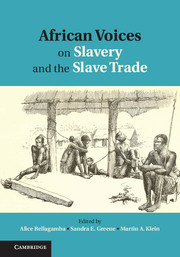Book contents
- African Voices on Slavery and the Slave Trade
- African Voices on Slavery and the Slave Trade
- Copyright page
- Contents
- Figures
- Contributors
- Foreword Beyond the Printed Word
- Introduction Finding the African Voice
- Part One Remembering Slavery and the Slave Trade
- Part Two The Verbal Arts and Everyday Objects
- Part Three Documenting Our Own Histories and Cultural Practices
- Part Four Slavery Observed: European Travelers’ Accounts
- Part Five Administrative Records
- Part Six Legal Records
- Part Seven Recorded Encounters with the Enslaved: Christian Workers in Africa
- Part Eight Documents from Muslim Africa
- 41 Introduction:
- 42 The Arabic Letters of Ghadames Slaves in the Niger Bend, 1860–1900
- 43 The “Hidden Transcripts” and Legal Rights of Slaves in the Muslim World
- 44 Slave Wills along the Swahili Coast
- Part Nine Living with the Past
- Index
43 - The “Hidden Transcripts” and Legal Rights of Slaves in the Muslim World
A Legal Case from Nineteenth-Century Mauritania
from Part Eight - Documents from Muslim Africa
Published online by Cambridge University Press: 05 April 2013
- African Voices on Slavery and the Slave Trade
- African Voices on Slavery and the Slave Trade
- Copyright page
- Contents
- Figures
- Contributors
- Foreword Beyond the Printed Word
- Introduction Finding the African Voice
- Part One Remembering Slavery and the Slave Trade
- Part Two The Verbal Arts and Everyday Objects
- Part Three Documenting Our Own Histories and Cultural Practices
- Part Four Slavery Observed: European Travelers’ Accounts
- Part Five Administrative Records
- Part Six Legal Records
- Part Seven Recorded Encounters with the Enslaved: Christian Workers in Africa
- Part Eight Documents from Muslim Africa
- 41 Introduction:
- 42 The Arabic Letters of Ghadames Slaves in the Niger Bend, 1860–1900
- 43 The “Hidden Transcripts” and Legal Rights of Slaves in the Muslim World
- 44 Slave Wills along the Swahili Coast
- Part Nine Living with the Past
- Index
Summary
Keywords
- Type
- Chapter
- Information
- African Voices on Slavery and the Slave Trade , pp. 503 - 510Publisher: Cambridge University PressPrint publication year: 2013

